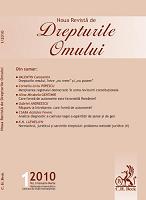Care formă de autonomie este favorabilă României?
Which Form of Autonomy Is Favorable to Romania?
Author(s): Alina-Mirabela GentimirSubject(s): Politics / Political Sciences
Published by: Centrul de Studii Internationale
Keywords: national minorities; international instruments; territorial autonomy; cultural autonomy; National Minorities Statute; Venice Commission
Summary/Abstract: Romania has adopted a democratic, human-rights-based perspective on religious and linguistic diversity after 1989. The efforts to harmonize domestic law with international standards have clearly proven the constant interest in guaranteeing the individual rights and liberties of the members of national minorities. The 2003 Constitution of Romania and the National Minorities Statute both acknowledge a right to cultural autonomy: to use the mother tongue in the court system, in education and in administration. As the Hungarian minority is the most important of its kind in Romania, the Bucharest authorities have been engaged in a constant dialogue with those in Budapest. The sensitive context in the Balkans and the two countries’ EU membership show that territorial autonomy in the three districts where Hungarians make up a majority of the population would be ineffectual.
Journal: Noua Revistă de Drepturile Omului
- Issue Year: 6/2010
- Issue No: 1
- Page Range: 20-31
- Page Count: 12
- Language: Romanian

